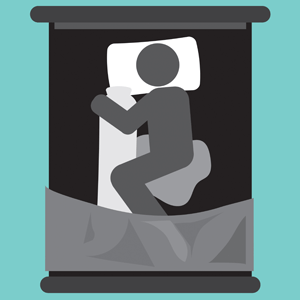
Is it normal for children to wet themselves? Could it be an underlying disease or infection, or even a sign of psychological difficulties?
Children who wet the bed are not lazy, naughty, or disobedient. This is according to clinical psychologist Dr Ian Opperman.
Dr Opperman, who is in private practice in Johannesburg and serves on the Executive Committee of the Psychological Society of South Africa (PsySSA), explained to Health24 that there are two types of enuresis, the medical term for bedwetting.
"Primary enuresis means that bedwetting has occurred since early childhood without a break, with no period during which the child does not wet their bed," he said.
"Secondary bedwetting is when bedwetting occurs after at least six months of not wetting their bed, and is usually caused by a stressor such as a sudden change, a psychological factor, a physical factor such as infection etc."
Is it normal for children to wet themselves?
Some people remember as a child, dreaming that they are waking up, getting out of bed, taking their pyjamas off, going to the bathroom, and urinating in the toilet; and then when they really do wake up, they wake up in a wet bed, noted Dr Opperman.
"Children naturally gain bladder control at night, however, this occurs at different ages."
Why some children struggle with their bladder
Bedwetting can be a symptom of an underlying disease or infection, however in most cases there isn’t an underlying disease or infection to explain the condition, he said.
"This, of course, does not mean that children who wet their beds are doing so on purpose. Children who wet the bed are not lazy, naughty, or disobedient."
Dr Opperman said unless children wet themselves as an act of defiance when awake, peeing while asleep is an involuntary act which they are not responsible for.
Could bedwetting be a sign of psychological distress?
Secondary bedwetting can be a sign of an underlying emotional or medical problem.
Dr Opperman said emotional problems causing bedwetting are things such as a stressful home life; parental conflict; major changes such as starting at a new school or a new baby; physical or sexual abuse; and other stressors.
"Emotional and psychological difficulties or stressors can be dealt with in therapy to assist with bedwetting.
"The child with secondary bedwetting is much more likely to have other symptoms, for example daytime wetting," said Dr Opperman.
This is usually caused by urinary tract infections, diabetes (i.e. diabetes increases sugar levels in one’s body, therefore you urinate more often as your body tries to get rid of the sugar), structural or anatomical abnormalities, neurological abnormalities, delayed bladder maturation low anti-diuretic hormone (ADH – Hormone that tells the kidneys to make less urine), deep sleep, smaller functional bladder (during sleep the bladder signals earlier that it is full), constipation (full bowels press against the bladder), and emotional problems.
Read: Bedwetting can be due to undiagnosed constipation
Constipation is probably the number one cause of bedwetting, but other causes must not be excluded, Dr Christel du Buisson, Paediatric Nephrologist and Senior Specialist at Tygerberg Children’s Hospital and University of Stellenbosch, told Health24.
It may be that the child started to drink much more and is urinating an immense amount and is constantly thirsty.
"This could be the first sign of diabetes or your child could have recurrent urinary tract infections. The causes are extensive, but as a parent one should look for the signs."
Dr Du Buisson went on to explain that children are born with an immature connection between the bladder and the brain.
"When you are born, you do not have the ability to sense that your bladder is full and thus you need to urinate."
This sensation and connection is only formed later; and for girls it is around the age of 2 and boys 3, she noted.
"At this time you might see that your child starts to cross their legs or pinch or hold their perineum or if they can converse, they would say something. The connection is not just made physically, but also to exposure to older children and parents in the house, by physically seeing them urinate and pass stool."
She pointed out that after the age of 5 years the following may be diagnosed:
Daytime incontinence: When your child wets occasionally during the day or even leaves just a wet spot on their underwear.
Enuresis: When your child wets after going to bed.
Primary enuresis: When your child has never had the ability to be dry at night, or for a short period no longer than 6 months.
Secondary enuresis: When your child has been dry at night for 6 months or longer.
Continuous dribbling: This is never normal at any age and should be investigated as soon as possible.
Dr Du Buisson pointed out that for parents to know if something is wrong, they have to keep an eye on their child.
"Watch their habits; look at their behaviour during the day. Check how much they drink, how many times they need to go to the toilet and how many times they actually go to the toilet."
If any of these warning signs are seen, parents should take their child to a GP or paediatrician for an evaluation, recommended Dr Du Buisson.
Do you have concerns over bedwetting? Ask Health24's incontinence expert Prenevin Govender.
Also read:
Bedwetting accidents: When parents kill... (Part 1)
What to do if your child wets the bed (Part 3)
Image: Bedwetting graphic from iStock




 Publications
Publications
 Partners
Partners










